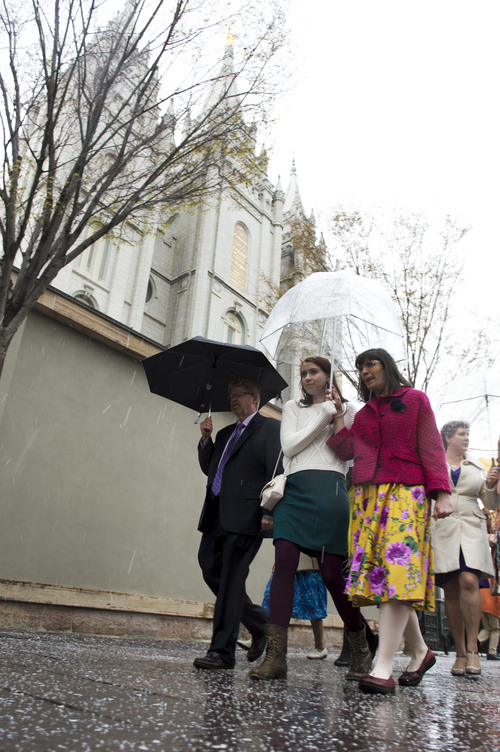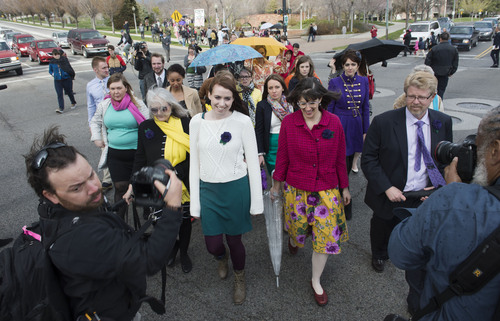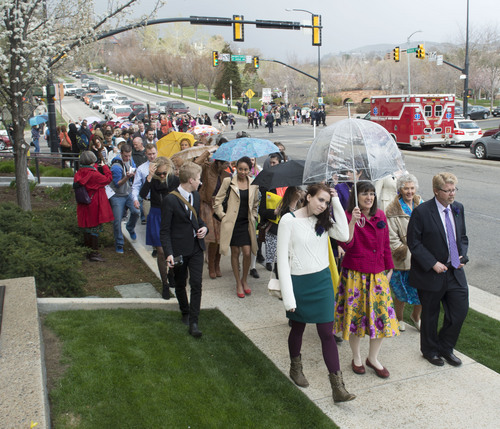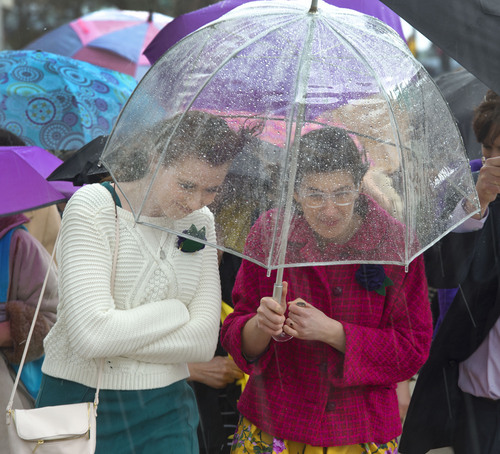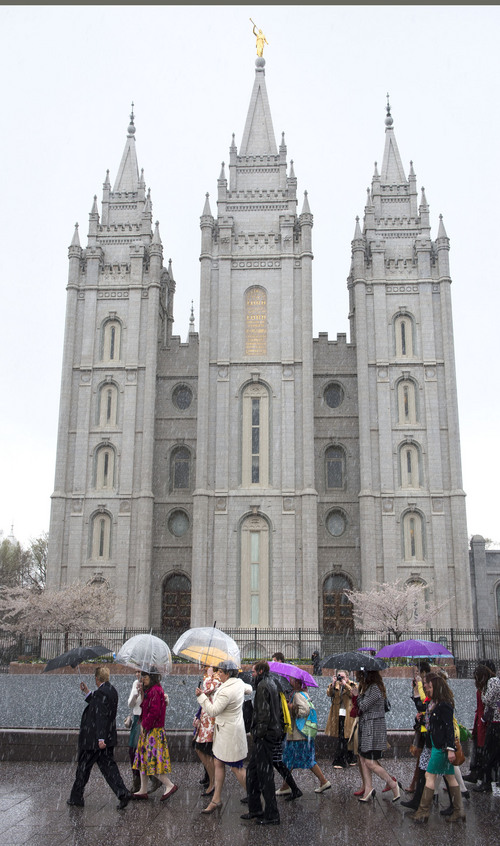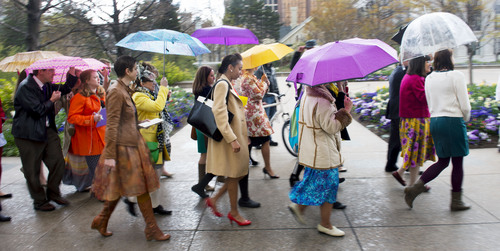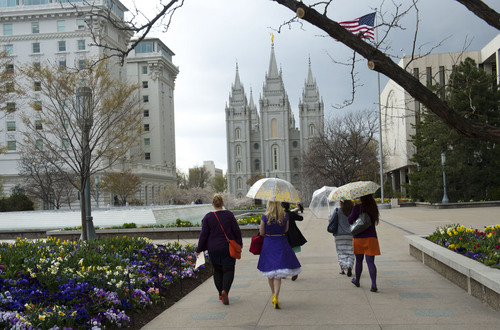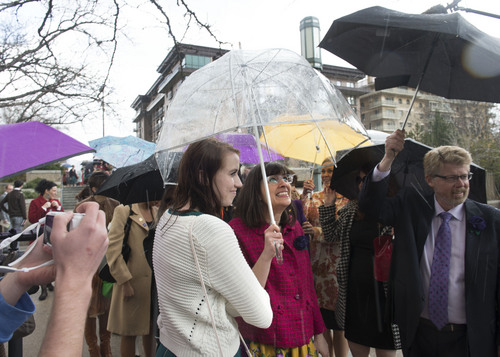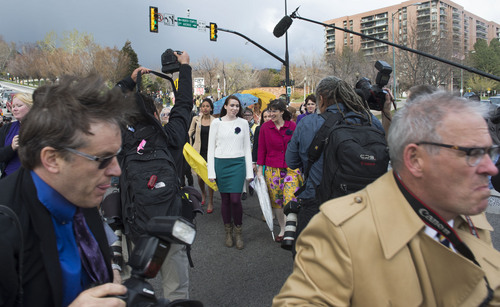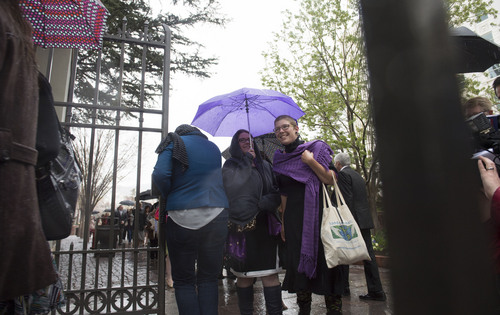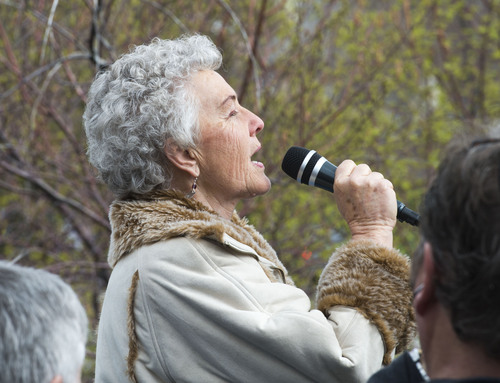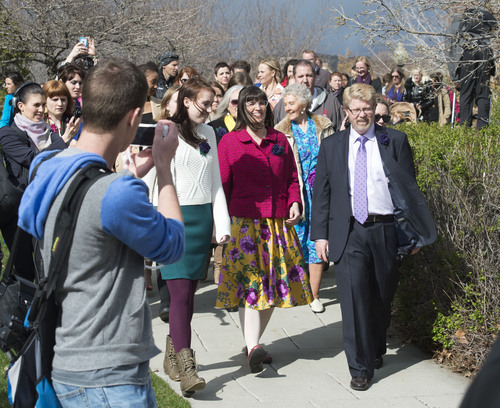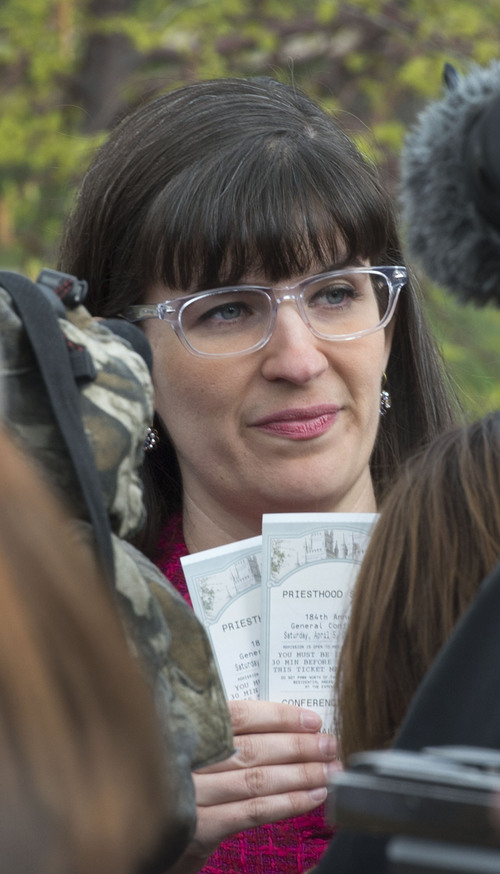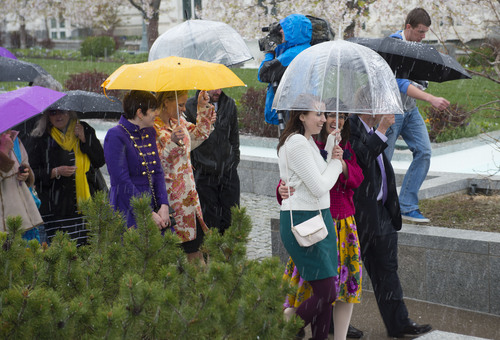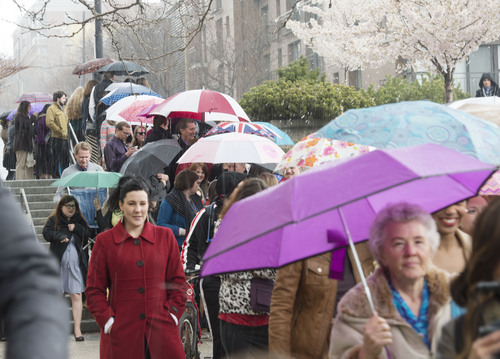This is an archived article that was published on sltrib.com in 2014, and information in the article may be outdated. It is provided only for personal research purposes and may not be reprinted.
For the second time in six months, hundreds of women seeking ordination to the Mormon priesthood were turned away Saturday when they sought tickets to an all-male priesthood session.
Their goal, several said, was to get the attention of the First Presidency and other leaders of The Church of Jesus Christ of Latter-day Saints.
Apparently they did.
An LDS Church statement indicated patience is wearing thin with the Ordain Women group's efforts.
"Despite polite and respectful requests from church leaders not to make Temple Square a place of protest, a mixed group of men and women ignored that request and staged a demonstration outside the Tabernacle on General Conference weekend, refusing to accept ushers' directions and refusing to leave when asked," church spokesman Cody Craynor wrote in an email Saturday evening.
"While not all the protesters were members of the church, such divisive actions are not the kind of behavior that is expected from Latter-day Saints and will be as disappointing to our members as it is to church leaders."
Ordain Women organizers have said the attempt to gain access to the general priesthood meeting won't be repeated — at least for a few years. But efforts to persuade Mormon leaders that the Utah-based faith is hurting itself by treating men and women unequally will continue, they said Saturday.
"I have no right to remain silent when gender inequality causes so many people to leave the church," Ordain Women organizer Kate Kelly told the throngs of women and men when they met in City Creek Park before marching to downtown Salt Lake City's Temple Square.
The women and men sang "Come, Come, Ye Saints," and prayed that God "would soften the hearts" of those who met them at the gate of Temple Square, in the words of Nancy Ross, who offered the prayer.
"There are hundreds, there are thousands of people who think like me," Kelly told the crowd.
Several young women who joined in the march said they felt led to attend.
"I love this church and I have always felt there was an inequality in the church," said Sandy resident Amanda Hechler, a third-year medical student at the University of Utah.
As a child, she was bothered when her aspirations to be a doctor were minimized by people who said she should instead be a mother. "I wanted to be both," she said.
Clinton resident Julliana Lund said she is following the prescribed path for Mormon women: She has three children and "never met a craft I didn't like." She had knitting in her bag Saturday evening.
But Lund, born in Brazil, said she remembers crying as a child because she knew she could not hold the LDS priesthood. "I had to pretend it doesn't matter."
Rachel Toth, a doctoral candidate in molecular biology at the U., said she doesn't worry that other Mormons may be put off by the women's activism.
"Our audience is the First Presidency and Quorum of the Twelve," she said. "That's who we want to be heard by."
Ordain Women organizers said they carefully logged Saturday's turnout, putting it at 510. Journalists at the park pegged it at closer to 200, which still would be twice as many as took part in a similar event at last October's semiannual LDS conference. Marchers also carried proxy cards with the names of 300 people who would have attended if they could have.
The women hoped their "action," as they labeled it, would "call attention to the need for the ordination of Mormon women to the priesthood and ask our leaders to prayerfully consider women's ordination," according to Ordain Women's website.
The LDS Church, however, tried to curb publicity for the group, banning news photographers and reporters during the two-day conference from Temple Square. The Tabernacle, where standby tickets to the all-male priesthood meeting are distributed, is on the square. The priesthood session itself took place across the street in the Conference Center.
Last fall, news photographers captured pictures of a church worker turning away the women, one by one, from the ticket line.
Some reporters and photographers entered the square with the women Saturday, but most were asked to leave after about 10 or 15 minutes.
The church said the media ban was consistent with a long-standing policy against news reporting from Temple Square, and that the interaction between the press and "protesters" last fall was disruptive to the sacred atmosphere of the place. The church didn't want a repeat of that.
Notwithstanding any policy, photojournalists and reporters often have been allowed on Temple Square during the twice-yearly gatherings to capture church members' images and their reactions to conference talks and announcements.
The Utah Headliners Chapter of the Society of Professional Journalists tried, but failed, to persuade church officials to allow media access this year.
LDS officials initially had asked Ordain Women not to enter Temple Square this conference, but by last week apparently had accepted that the group intended to enter.
On Saturday, the women were met at the gate by a church representative, who asked them to go to the public protest area outside the square, Kelly said. Instead, they walked onto the square, where they formed a line circling the Tabernacle and, one by one, asked a church spokeswoman for tickets to the priesthood session. Each woman was rejected.
Ordain Women had hired police officers as escorts Saturday night.
Kelly called the church's statement after the event "unnecessarily harsh." She said once the women were inside the square, they were not asked to leave.
The group's leaders were careful about Ordain Women's image, hoping to convey that the movement is comprised of faithful Mormons who respectfully differ with their LDS leaders — as well as a majority of their sisters in the church.
Only 8 percent of Mormon women, according to a 2011 Pew Research Center survey, believe women should ordained to the priesthood.
On the group's website, Ordain Women's leaders gave these directives to those taking part in Saturday's march:
• Don't use sarcasm or speak contemptuously of the church.
• Don't call it a "protest."
• Use conciliatory and calm body language and tone, if confronted.
• Wear Sunday best clothes.
Twitter: @KristenMoulton


